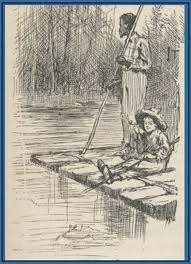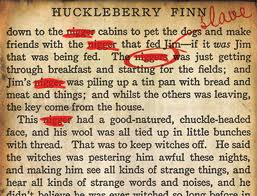It is a curious incongruity that Mark Twain’s Adventures of Huckleberry Finn - widely considered one of the great American novels - was first published in Great Britain. Released stateside in February 1885, the book has remained in constant state of controversy ever since. The subject of that controversy, however, has vacillated considerably according to the mores of the time.
Twain initially intended the book as a sequel to The Adventures of Tom Sawyer. Its first working title was Huckleberry Finn’s Autobiography; Twain planned to follow Finn’s life from childhood through adulthood. However, after several years of work, the story failed to develop and Twain set the manuscript aside. It was only after Twain’s trip down the Hudson River that he gained fresh inspiration and again resumed writing. The result, Adventures of Huckleberry Finn, has become one of the United States’ most beloved novels and one of the first examples of vernacular writing in American literature.
The book follows young Huckleberry Finn and Jim, a runaway slave, as they travel by raft on the Mississippi River. A story about racism, friendship, and hypocrisy, Finn repeatedly wrangles with his conscience about whether it is right to help Jim escape or whether he is stealing someone’s property. Finn ultimately decides to defy religious and social convention in order to free Jim, concluding "All right, then, I'll go to hell!" Twain described the novel as “a book of mine where a sound heart and a deformed conscience come into collision and conscience suffers defeat.”
Immediately after its publication in 1885, many libraries banned the book, deeming it unnecessarily crude and vulgar. A newspaper, the Boston Transcript, described one such incident:
“The Concord (Mass.) Public Library committee has decided to exclude Mark Twain's latest book from the library. One member of the committee says that, while he does not wish to call it immoral, he thinks it contains but little humor, and that of a very coarse type. He regards it as the veriest trash. The library and the other members of the committee entertain similar views, characterizing it as rough, coarse, and inelegant, dealing with a series of experiences not elevating, the whole book being more suited to the slums than to intelligent, respectable people.”
Twain responded to his editor, “Apparently, the Concord library has condemned Huck as 'trash and only suitable for the slums.' This will sell us another twenty-five thousand copies for sure!"
Others found fault with the book’s conclusion. While Ernest Hemingway praised the novel overall, he warned potential readers, “If you must read it you must stop where the Nigger Jim is stolen from the boys. That is the real end. The rest is just cheating.” Pulitzer Prize winner Ron Powers concurred, “Huckleberry Finn endures as a consensus masterpiece despite those final chapters.” Indeed, Hemingway argued that the book “devolves into little more than minstrel-show satire and broad comedy.” Even T. S. Eliot and Lionel Trilling—strong advocates of the book—felt the need to explain away the end.
More recently, Adventures of Huckleberry Finn has been criticized for its perceived use of racial stereotypes and its persistent use of the word “nigger.” While most agree that Twain intended the book as an attack on racism, others argue that Twain failed to rise above racial paradigms of the time. According to the American Library Association, Adventures of Huckleberry Finn was the fifth most challenged book in 2007, the reason cited was “racism.”
Many schools have pulled Adventures of Huckleberry Finn from their curriculums to avoid these questions of race. Banned in the U.S.A., a reference guide to censorship, named it the fourth most banned book in schools. In 2011, Auburn University professor, Alan Gribben, sought to keep the novel in the classroom by publishing a new edition that replaced the word “nigger” with “slave.” This inspired impassioned debate over whether it was right to “sanitize” Twain’s language. While some praised his efforts, most opposed his choice. A blogger from The Economist wrote, “The ‘visible sense of relief’ Mr Gribben reports in his listeners is not, in fact, desirable; feeling discomfort when you read the book today is part of the point of reading it.”
Despite the controversy, one cannot discount the book's importance. According to Hemingway, all American Literature came from Adventures of Huckleberry Finn; he wrote, "There was nothing before. There has been nothing as good since."












